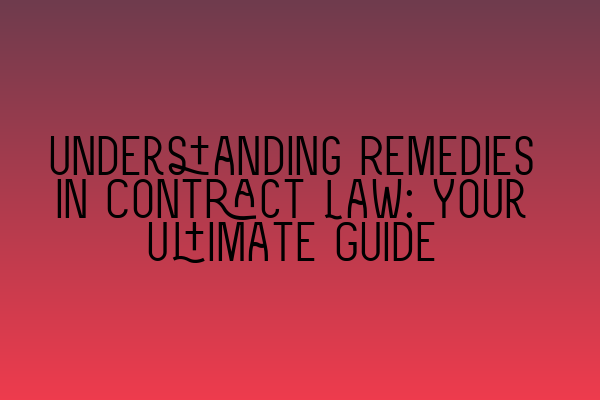Understanding Remedies in Contract Law: Your Ultimate Guide
When entering into a contract, it is essential to consider the potential remedies available in case one party fails to fulfill their contractual obligations. Remedies in contract law are the legal means by which a party can seek compensation or enforcement of the contract. In this comprehensive guide, we will explore the various remedies in contract law, what they entail, and when they can be sought.
1. Understanding Breach of Contract
Before delving into the remedies, it is crucial to understand the concept of breach of contract. A breach occurs when one party fails to perform the duties outlined in the contract. This can be a total failure or a partial failure to fulfill obligations. Breaches can be categorized as either a material breach, which goes to the heart of the contract, or a minor breach, which is considered less significant.
2. Types of Remedies in Contract Law
There are several types of remedies available to parties affected by a breach of contract. These can be broadly classified into two categories: legal remedies and equitable remedies.
a. Legal Remedies
Legal remedies aim to compensate the injured party for the losses incurred due to the breach. The most common legal remedies include:
i. Damages: Damages are monetary compensation awarded to the injured party. They aim to place the injured party in the same financial position they would have been in had the breach not occurred. There are different types of damages, such as compensatory damages, which aim to compensate for the direct loss suffered, and consequential damages, which compensate for indirect losses resulting from the breach.
ii. Specific Performance: In certain cases, the court may order the breaching party to fulfill their contractual obligations as specified in the contract. This remedy is commonly sought when the subject matter of the contract is unique or when monetary compensation would not adequately remedy the breach.
iii. Restitution: Restitution is a remedy that involves returning any benefits received under the contract. If one party has already received a benefit from the contract, but the other party breaches, they may be required to return that benefit.
b. Equitable Remedies
Equitable remedies focus on fairness and aim to prevent unjust enrichment or enforce specific actions. Some common equitable remedies include:
i. Injunctions: An injunction is a court order that requires a party to either refrain from doing something (prohibitory injunction) or carry out a specific action (mandatory injunction). In contract law, injunctions are sought to prevent a party from breaching a contract or to enforce specific performance.
ii. Rescission: Rescission allows a party to cancel the contract based on the other party’s breach. Rescission restores both parties to their pre-contractual positions and cancels any further obligations under the agreement.
iii. Reformation: Reformation is a remedy that allows the court to modify or alter the terms of the contract to reflect the true intentions of the parties. This remedy is typically sought when a contract contains a mistake or ambiguity that requires clarification.
3. When to Seek Remedies
The choice of remedy depends on various factors, including the nature and severity of the breach, the specific terms of the contract, and the desired outcome of the injured party. Legal remedies are the most commonly sought, as they offer monetary compensation, which is generally easier to obtain compared to equitable remedies. However, in certain circumstances, such as when a unique item is involved or when monetary compensation is insufficient, seeking equitable remedies may be more appropriate.
4. Seeking Legal Advice
Navigating the complexities of remedies in contract law can be challenging. It is crucial to seek legal advice early on to understand your rights and explore the best course of action. An experienced contract law solicitor can provide guidance tailored to your specific situation and assist you with pursuing the most suitable remedy.
To learn more about related topics, read our articles:
– Exploring the Impact of Frustration on Contractual Obligations: Legal Insights
– Interpreting Contractual Clauses: Unlocking the Hidden Meanings
– Legal Aspects of Business Contracts: Key Considerations for Entrepreneurs
– Agreements in Contract Law: Understanding Its Various Types
– Essentials of Consideration: Understanding the Basis of Contractual Exchange
Understanding remedies in contract law is essential for protecting your rights and ensuring fair outcomes in case of a breach. By familiarizing yourself with the available remedies, you can make informed decisions and seek appropriate compensation or enforcement when necessary.
